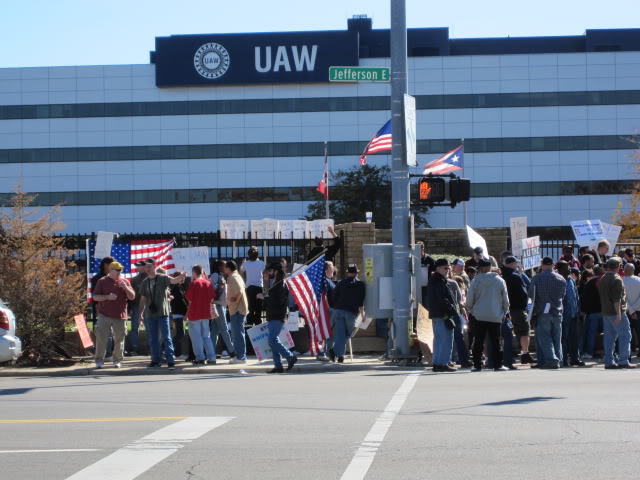The UAW spent millions trying to unionize Nissan only to fail miserably. Here are five things that explain where the UAW went wrong.
Late last Friday night, the much-anticipated results of the National Labor Relations Board (NLRB) election at Nissan’s plant in Canton, Mississippi were announced to the world.
For the second time in just over three years, the United Auto Workers suffered another humiliating defeat at a Southern auto plant.
This time though, unlike the much closer 2014 election at Volkswagen’s plant in Tennessee, Nissan’s employees voted nearly two to one against unionization.

So, what went wrong for the UAW?
In the aftermath of Friday’s overwhelming defeat, the UAW predictably vowed to press on with its claims that Nissan engaged in unlawful interference.
 It is likely that the UAW is hoping that the NLRB will order another election and, at a minimum, put a gag order on Nissan’s ability to communicate with its employees.
It is likely that the UAW is hoping that the NLRB will order another election and, at a minimum, put a gag order on Nissan’s ability to communicate with its employees.
Although that could take months, or even years, the outcome for the UAW is far from certain.
While unions often claim companies “interfered” with their employees’ choice about unionization when they lose, those claims do not typically result in improving a union’s chances at unionizing those employees.
“Unions historically perform worse, not better, when a second election is held,” as the USA Today noted over the weekend.
Even if the UAW’s charges against Nissan were ruled on by the NLRB to have merit—which may happen given the pro-union nature of the NLRB—this would not necessarily explain the overwhelming margin of defeat Nissan’s employees handed to the UAW.
If the UAW had gone into the election with as large amount of employee support as the UAW had claimed it had, even if Nissan did interfere, the margin should have been much closer.
After all, even though the vast majority of companies communicate with their employees during unionization campaigns, unions still win around 70% of all NLRB elections.
So, what then caused employees to so resoundingly reject the UAW?
Here are five reasons that may explain why the UAW suffered such a humiliating defeat.
1. The UAW never had a majority of Nissan employees’ support
A timing issue. While the UAW only needed 30 percent of Nissan’s employees to sign union authorization cards to call for an election, most unions like to have a strong majority of employees signed up before they move forward.
This may not have happened at Nissan.
The UAW has been trying to garner support at Nissan’s plant in Mississippi for years. However, the union may have decided that it was running short on time (and support).
If a union is getting signatures from employees over a long period of time, it runs the risk of having those signatures become “stale” after one year in the eyes of the NLRB and, therefore, not counted towards the 30 percent needed for an election.
It is entirely possible that the UAW’s organizers faced a timing issue with authorization cards going stale and filed their petition “light.”
Did UAW organizers use “temps'” signatures? Many of the workers at Nissan’s plant are so-called “temps” who were not eligible to vote.
It is very possible that the UAW’s “showing of interest” to file its petition came from a number of authorization cards signed by temp workers, not actual Nissan employees.
In fact, one comment on the Facebook page UAW Facts seems to bear this theory out, wherein the commenter claimed the UAW had gotten signatures from temps.
If this is the case, it is possible the UAW never had the Nissan employee support it confidently claimed it had.
2. The UAW’s top-down ‘astroturf’ organizing model.
Since losing two-thirds of its membership since 1979, the UAW has been very open in stating that its survival is dependent on its ability to unionize foreign automakers’ U.S. plants.

Simply put, the UAW needs the employees of foreign automakers more than they need the UAW.
As a result, the UAW has gone to great lengths to try to unionize employees who don’t necessarily want or believe they need the union.
A case in point was the secret “sweetheart” deal the UAW made with Volkswagen in 2014 to unionize VW’s workers in exchange for VW staying “neutral” during its campaign.
Since then, UAW officials have made numerous trips to Europe, as well as spent tens of thousands of UAW members’ dues on French consultants and PR firm to help push the union’s interests overseas.
These efforts have all been in order to pressure the car companies into allowing the UAW to unionize the auto plants in the South with minimal or no opposition.
This is an example of the UAW’s ‘top-down’ unionization approach, not a groundswell of employee ‘grassroots’ support.
With a top-down approach, much like the SEU’s multi-million dollar ‘Fight For $15’ campaign to unionize the fast-food industry, the UAW’s campaign at Nissan had much shallower roots inside Nissan and a more ‘astroturf’ nature to it.
Instead of Nissan employees taking the lead, they were led and fed a steady diet of pro-union talking points by out-of-towners who were supplemented by paid activists who marched to the UAW’s drum.
3. The UAW’s wrong-headed approach to wages
It is a well-known fact that Mississippi has one of the highest poverty rates in the nation.
Therefore, a company like Nissan building a plant and bringing thousands of jobs to Mississippi is a huge boost to not only the people employed by Nissan, but people throughout a significant portion of the state, as this brief video (posted by Nissan) explains.
While Nissan’s wages may be below that of a 20 or 30-year UAW member working for one of the Detroit Three car companies, considering the cost of living in Mississippi, Nissan jobs are among the highest paid in the state.
Additionally, Nissan’s wages are very similar to the wages negotiated by the UAW in its prior two-tier contract and are still comparable to the UAW’s current contract with the Detroit Three.
More importantly, though, it is highly likely that many within the vicinity of the Canton plant realize that the jobs at Nissan pay more than most other jobs they could get within the region.
“Most of us just have a high school education,” Kim Barber, a quality technician who has been with Nissan since the plant opened, told the New York Times. “I’m almost 50. I can’t go anywhere else.”
Ms. Barber said she made about $26 an hour, roughly twice what she made in her previous job driving a forklift at a storage company, adjusting for inflation.
The result of this is that, with Nissan as the state’s largest employer, it is likely that many employees brushed past the UAW’s promises of somehow getting them a “better deal,” knowing that their jobs are the envy of many across the entire state.
4. The UAW’s star-studded race-based campaign-for-hire was poorly thought out
For years, in its attempt to unionize Nissan, the union has used race as a tactic to drum up support among Nissan’s workforce.
In doing so, the UAW has enlisted the paid support of local pastors, community leaders and activists, as well as progressive “stars,” actor Danny Glover and socialist Senator Bernie Sanders.
These efforts may have given the UAW a false sense of security by trusting that employees would blindly follow the leaders the UAW hired. as employees appear to have been able to see through the tactic.
First, in its attempt to divide the Nissan employees along racial lines, the UAW probably did not count on the fact that many of the Nissan employees who oppose unionization are racially diverse as well.

Secondly, the Nissan employees who opposed to unionization appropriately called into question the moneys the UAW paid to the “civil rights” groups and pastors, rhetorically asking:
In light of the recent discovery of the hundreds of thousands of $$$ that the UAW has paid to church related groups during its campaign at Nissan if your pastor gets on stage this morning and urges you to vote yes for the union you need to be asking yourself is that the word of God or the word of a man on the take from the union?

The actor who couldn’t answer a question.
Although he had been to Canton on several occasions, even actor Danny Glover seemed to wear out his welcome, with one employee even posting on Facebook that Glover “don’t know squat” and “can’t answer a single question.”

Bernie Sanders is ill-suited for the South
The UAW’s continued usage all the way up to the election of Democratic-Socialist Bernie Sanders seems to also have been a mistake.
While Sanders is an icon for many “progressives” around the country—and especially the Northeast—he doesn’t not have as much popularity in the South.
Moreover, Sanders’ “star appeal” has never been that popular with African-American voters in the South, as Politico noted in 2016.
One of Sanders’ problems is that while African-Americans vote liberal, they are not white liberals like the ones he’s been mobilizing in his campaign. Black Democrats tend to be more socially conservative, pragmatic, and independent than many white politicians and pundits assume.
What makes Sanders an even poorer choice is that he is an atheist…an atheist trying to preach the virtues of the union to a predominantly-Christian crowd.
Had the Detroit-based UAW organizers done their homework, they might have known that Sanders would have very little impact on a Southern workforce for anything other than a PR prop for audiences outside Mississippi.
Comparing well-paid work to ‘slavery’ and Nissan to a ‘plantation’.
Perhaps one of largest blunders the UAW might have made is the distribution of pro-UAW shirts to union supporters comparing work at Nissan to “modern-day slavery” and the company as a “plantation.”
Other shirts reportedly read “Vote NO if you’re a slave.”
FYI @UAW: When (white) @UAW supporters in MS wear t-shirts comparing *paid* work to slavery, some people might get turned off. #NissanVote pic.twitter.com/lXpJqGFyq0
— TheAmericanWorkplace (@WorkPlaceRpt) August 5, 2017
For employees, many of whom may have had actual slaves as ancestors, this tactic was likely to have been highly offensive.
5. The UAW’s bribery scandal
In what could only be considered an ‘October Surprise’ gift to Nissan, one week before employees went to vote, news of a federal indictment involving a former Fiat-Chrysler executive and the UAW exploded across country.
News of a (now-deceased) high-ranking UAW official and his wife being bribed sent shockwaves throughout the union, and it had a ripple effect on the UAW’s campaign in Canton.
The UAW ‘fumed’ about the facts.
So far, it appears the UAW and its supporters are pinning their hopes at convincing the NLRB that Nissan violated the law and ‘interfered’ with employees’ choice through ‘threats and intimidation.’
“At a meeting of workers at the local U.A.W. office last week,” reported the New York Times, “union supporters fumed about a recent slide presentation in which managers explained that Nissan could not guarantee most workers their old jobs in the event of a strike.”
One worker, Chip Wells, later said in an interview that many colleagues were worried by the presentation, even though strikes are a rarity.
“It just scared a lot of people,” Mr. Wells said.
If the UAW is basing its claims on Nissan presenting employees with facts, it may be barking up the wrong tree.
While unions hate it when companies give facts to their employees during a union organization campaign, a company presenting facts has been legal since 1947.
The UAW to trying to blame Nissan for its loss in Mississippi without taking into account its own campaign flaws is, quite frankly…flawed.





